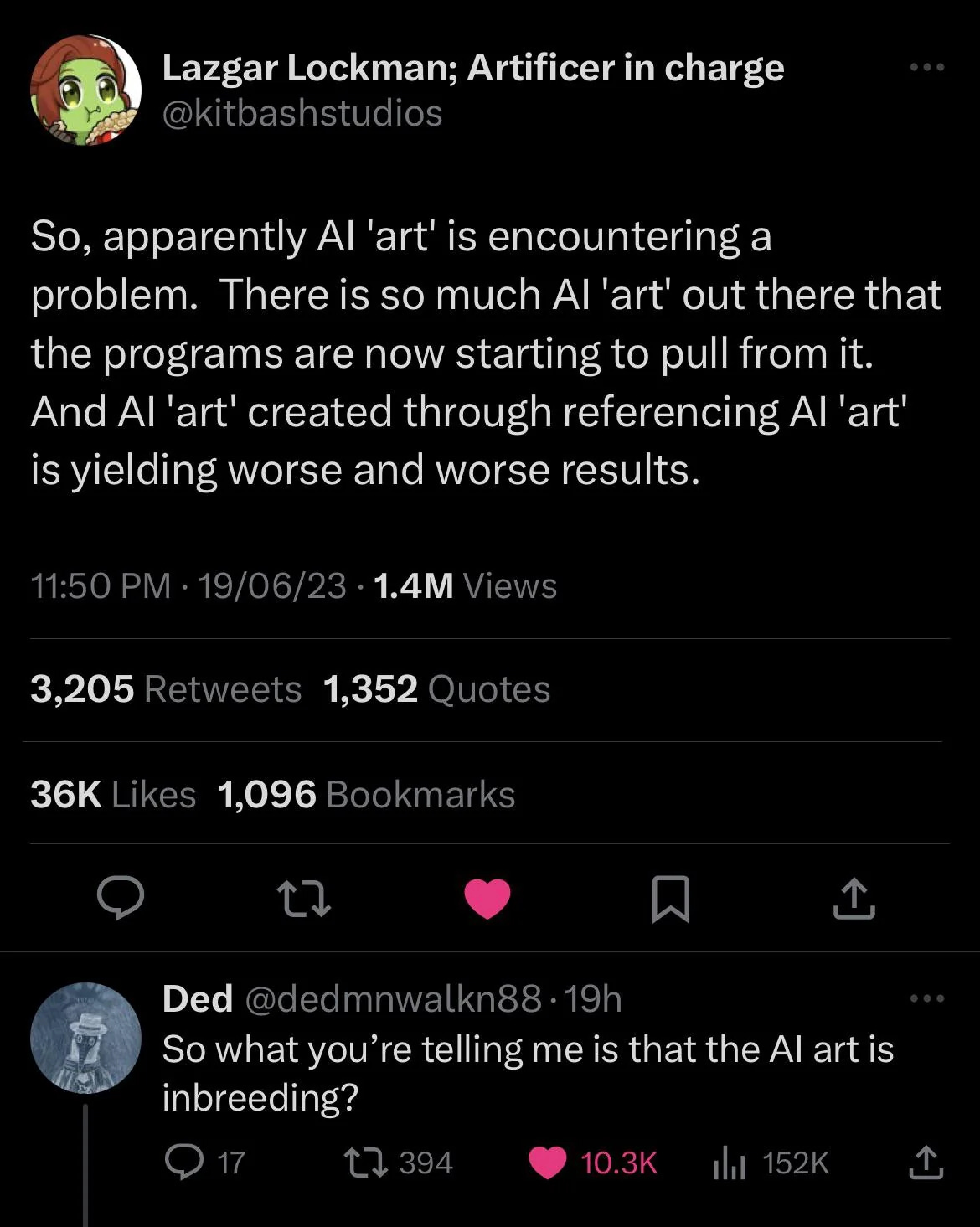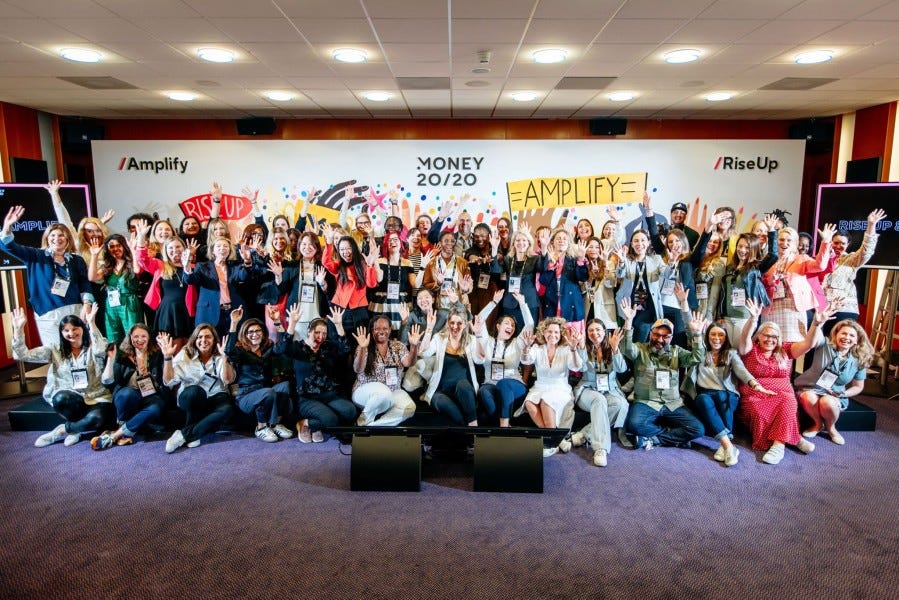Hello, my friends! Jules here with the latest dispatch from the tech and creative worlds.
I spent the first week of June at Money 20/20 in Amsterdam as part of its RiseUp program. It was an incredible experience, but what blew me away was the focus on AI. Yes, even in the fintech world.
I’m not exaggerating when I say the AI session rooms were overflowing. Trying to fit passionate founders, multitasking CEOs, and connection-focused biz-dev people into presentation halls resulted in chaos not even ChatGPT could predict.
All hype aside, AI in fintech is taking a different path than many other sectors. Its user focus, data-backed features, and diversity commitment drive a promising future. What can we learn from its path? Let’s start our engines and find out. 🏎
This Week in New AI Features 🤖
From the weird to the wow, AI features continue to redefine how we approach the internet. Here’s some fun ones from this week.
Get started with startups: Want to launch a startup but not sure of your business idea? Ideas AI provides GPT-3 generated business concepts.
Decode your dreams: If you’re curious about what your nightmare about ChatGPT taking your job means, this one’s for you.
Slide into their DMs with AI: Dating apps can be tough to navigate. With pickup lines AI, you never have to worry about the perfect opening message again.
Opera goes AI: Opera One offers users a native browser AI. Meet Aria, your new GPT-powered browser assistant.
Ace your interviews: TalkBerry simulates job interviews, including a voice-based AI hiring manager. It gives feedback on your spoken English and interview answers.
Consumer demand versus industry standards 🤺
If you’re new to fintech, it’s not as foreign as it might sound. While complex algorithms, crypto trading, and massive stock tickers are part of it, fintech also includes everyday applications. Think of your banking app, fraud prevention texts, and apps like Venmo and Zelle. Fintech connects more people to financial services. It makes banking more straightforward and accessible.
That being said, AI for fintech is an entirely different ball game than AI for creatives. Financial institutions must comply with extensive regulations. They cannot experiment in the same way as creative AI applications because laws govern most money-related pursuits. This isn’t a bad thing; it’s vital to keep the global financial system running smoothly.

Because of compliance needs, the fintech sector is taking a slower roll to AI features. Developers are in heads-down build mode to focus on delivering products with real user benefits.
Listening to user needs is the most essential aspect of introducing an AI product. This matters whether you’re a visionary startup founder or CEO of a top AI company. The current market is crowded, so you need to offer something useful to stand out.
And what do users care about?
- Security. Namely, your source material and their security as users. For us in the creative world, giving credit to creators is dominating AI conversations. For fintech, being clear about your training material is a great start. People want to know what steers your products. They’re also concerned (rightfully so!) about applications using data without their consent.
- Accessibility. Fintech is for everyone. While the most advanced machine learning model may wow devs, it won’t mean much to the everyday human (yet). Be sure to communicate feature benefits and emphasize a product’s context within the fintech space.
- Optimal helpfulness. AI is evolving – and quickly. The fintech sector is taking the right approach by not honing in on a dream audience segment or flashy feature. They’re building products that solve problems and meet human financial needs. In doing so, they’re buckling down for the long haul, not just a trend cycle.
If your wallet is ready for an AI makeover, fear not. While banks may still be in development mode, tools like ChatGPT can help make a budget customized to your lifestyle. Or check out Fina for finance tracking – no spreadsheets required.
Founders and features 💼
Fintech founders are optimistic (and patient) about AI in the sector. They’re using AI to design features like credit risk assessments, fraud detection, user security, automated customer service, financial forecasts, and more.
McKinsey predicts AI applications in banking could generate significant value for the industry, with an estimated $200 billion to $340 billion in additional revenue. Journalist Ruhma Khawaja describes AI in fintech as “paving the way for a better future.” She writes:
AI in FinTech is like having a financial expert who never sleeps, never gets tired, and never complains about coffee.
Sounds pretty great, right?
Partially. AI isn’t always a positive thing. Think of all the financial experts who need to sleep and require coffee to function–we’ve all been there. Human beings matter, especially considering fintech hasn’t been immune from the tech layoff wave. Companies like PayPal, SoFi, and Decent cut jobs in 2023. People are worried about AI’s impact on fintech employment.
Visionary leaders like Elizabeth Rossiello of AZA Finance, a fintech making it easier to do business with and within Africa, see AI as an opportunity in the jobs market. Here’s a snippet from her recent panel at the Bloomberg New Economy Gateway Africa in Morocco.
Who’s curating, editing, and analyzing what’s coming out of the AI? As an executive, I don’t want that bare minimum output. We can’t just expect [AI] to automate the continent or low-income jobs.
We need to train the African workforce, and it’s already being trained. They’re training themselves on mid-level management and executive management decisions to pull up the rest.
She’s right. The industry needs to adapt to AI and tap into its potential, planning for five years from now instead of for tomorrow.
Diversity in fintech will build better AI 🌐

More diversity in the fintech world doesn’t just benefit individuals. It ensures we train AI and other tools to be fairer. Here’s a great LinkedIn Live session from The Female Quotient exploring how to use machine learning to challenge bias instead of reinforce it.
Speaking of AI obstacles, I joined Stronghold, a Forbes 50 fintech company, for an episode of their Speak Bold podcast. Here’s a clip of how we can fight back against AI deepfakes–tune into the full YouTube episode if you want to learn more.
AI girl summer ☀️
As June draws to a close and OOOs trickle into our inboxes, much of the working world is entering summer mode. We’re full steam ahead at FQC HQ, but I want to hear from you in the meantime.
What do you want to read about in the coming months? What AI/ Web3/ emerging tech features have you excited, bored, or nervous? Are you curious about AI in a particular sector? Leave a comment with your thoughts, or shoot me a line on social media. Goodbye for now!
—
Read more on my Substack.
